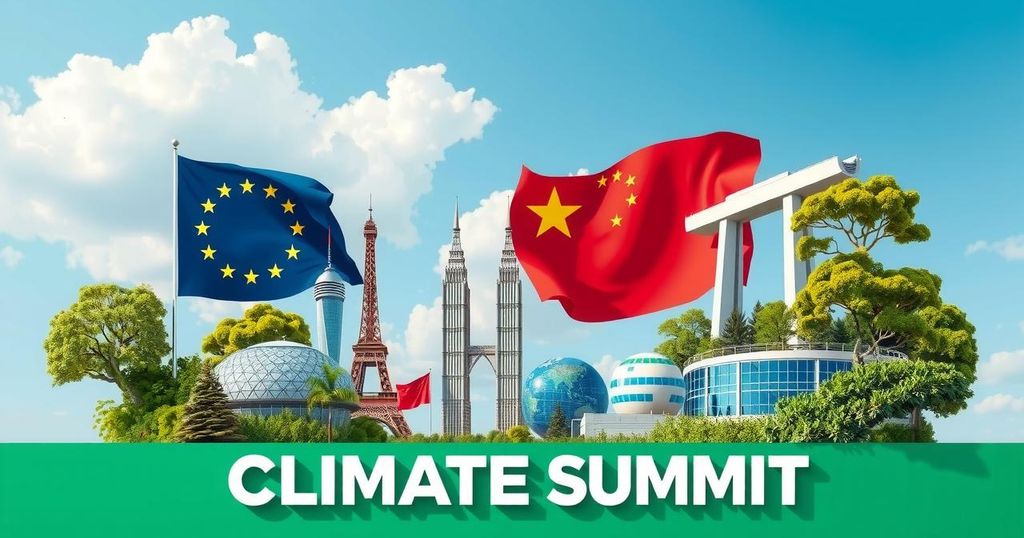Climate change
AFRICA, AFRICAN DEVELOPMENT BANK GROUP, BLUE ECONOMY,, CLIMATE CHANGE, CLIMATE RESILIENCE, COTE D, ENVIRONMENTAL PROTECTION, ETHIOPIA, FITSUM ASSEFA ADELA, HANAN MORSY, INTERNATIONAL COOPERATION, IVOIRE, JOSEFA LEONEL CORREIA SACKO, KEVIN KARIUKI, PARIS AGREEMENT, POWER, ENERGY, CLIMATE AND GREEN GROWTH, SOUTHERN AFRICA, UNITED NATIONS ECONOMIC COMMISSION FOR AFRICA
Leila Ramsay
0 Comments
African Climate Leadership: Key Actions and Opportunities at COP29
African nations are positioned to lead climate initiatives at COP29, advocating for crucial climate finance and addressing the intertwined issues of climate change, biodiversity loss, and pollution. The AMCEN Special Session stressed the importance of united action. While adaptation is essential, mitigation through Nationally Determined Contributions must shape a sustainable future for Africa that leverages its resources and innovative potential.
In the context of COP29, the leadership of African nations is crucial as they confront the interlinked crises of climate change, biodiversity loss, and pollution. The recent AMCEN Special Session, hosted by the Government of Côte d’Ivoire, underscored the urgent need for united action that aligns with the Rio Conventions and addresses environmental challenges. African nations, bearing the brunt of these crises, must advocate vigorously for the New Quantified Goal on Climate Finance to be established at COP29, a critical step in securing necessary resources for adaptation and resilience development. The World Meteorological Organization’s report emphasizes that by 2030, approximately 118 million people in Africa will face severe climate-related challenges, thereby compelling the international community to act. With an adaptation finance gap between $187 billion and $359 billion annually, creative financial strategies are vital. Efforts such as private sector investments and debt-for-nature swaps can amplify support for community resilience initiatives. Notably, while adaptation is imperative, mitigation remains as equally essential within the climate strategy. African nations are not the culprits of climate change; recent statistics reveal that their inclusion in the G20 increased its emissions by a mere 5 percent. However, this signifies the responsibility of major emitters to substantially reduce their greenhouse gas emissions by 42 percent by 2030 and 57 percent by 2035. Consequently, as African leaders craft new Nationally Determined Contributions (NDCs), they should position these pledges as pathways toward sustainable and low-carbon development, thus maximizing growth potential while minimizing environmental impact. Despite the adversities posed by climate change, Africa possesses extensive solutions rooted in its agricultural resources, innovative youth, and abundant energy transition minerals. The continent has the potential to not only endure but thrive in the transition to a greener economy, provided that mining is conducted responsibly and sustainably, with a focus on domestic value addition and environmental as well as social protections. Ultimately, global recognition of Africa’s pivotal role in combating climate change is essential, and the opportunity exists for African nations to emerge as leaders in this global challenge.
The pivotal role of African nations in addressing climate change and environmental degradation is underscored at international forums like COP29. Given the continent’s vulnerability to climate impacts and challenges such as drought, biodiversity loss, and pollution, it becomes increasingly imperative for African leadership to urge for enhanced climate finance and commitment from developed nations. The recent AMCEN Special Session highlighted the interconnectedness of these issues, advocating for integrated actions that align with established international agreements. With a focus on adaptation and mitigation strategies, African countries stand to leverage their natural resources and youth-led innovation to secure a sustainable future amidst the rising challenges of climate change.
As COP29 approaches, the call for African nations to advocate for significant climate finance and contribute to the solution of global environmental crises is paramount. The emphasis on both adaptation and mitigation strategies highlights the dual responsibilities of Africa in addressing climate issues while pioneering sustainable, low-carbon growth. By leveraging its natural assets and innovative potential, Africa can transform its challenges into opportunities, becoming a key player in global climate leadership.
Original Source: www.unep.org




Post Comment